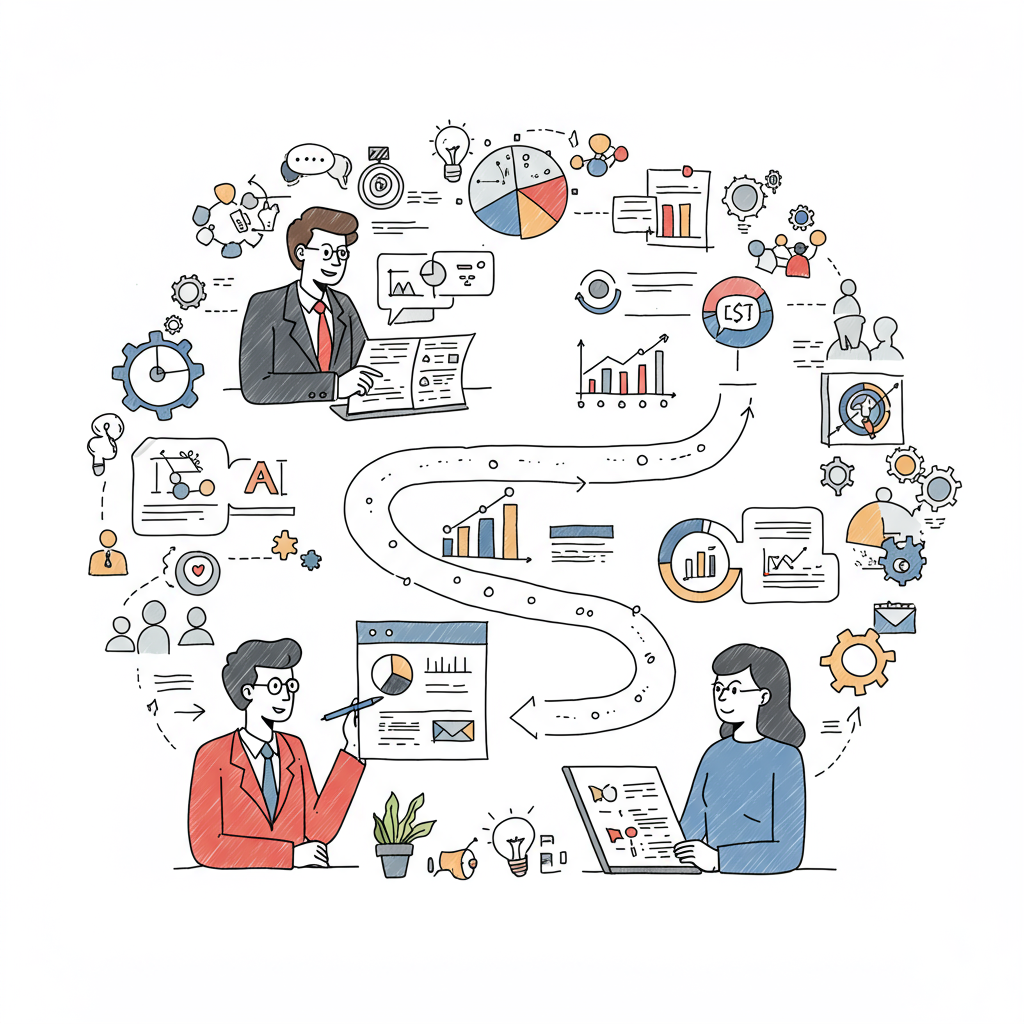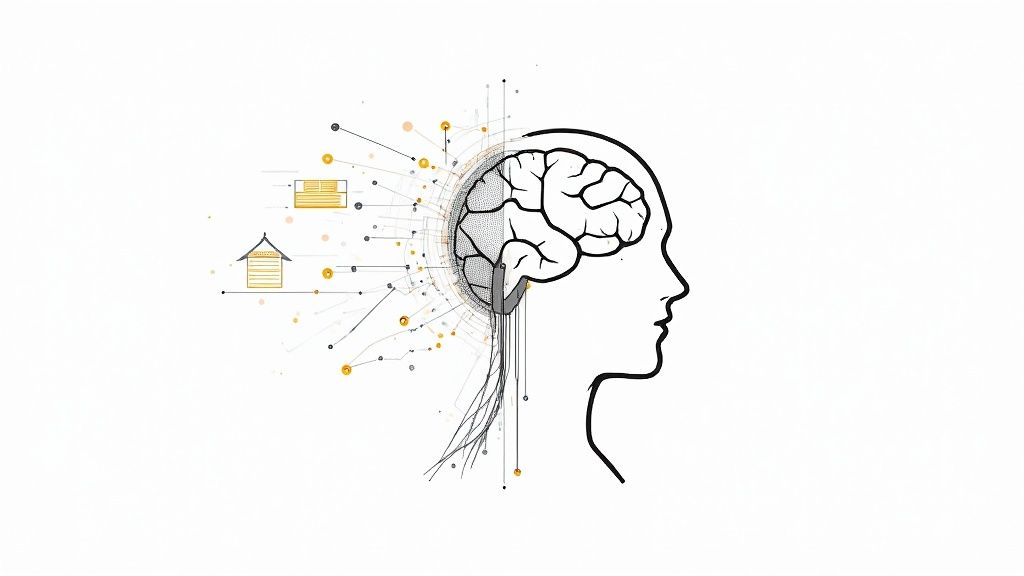AI and Healthcare A Practical Guide for Leaders
Discover how AI and healthcare are merging to revolutionize patient care. This guide covers diagnostics, operations, and strategic AI implementation.

Artificial intelligence isn't some far-off sci-fi dream for healthcare anymore; it's here, and it's making a real difference. For the UK, which is currently wrestling with mounting costs and a stretched workforce, AI presents a tangible way to elevate patient care, streamline how things get done, and push medical science forward.
The New Reality of AI in UK Healthcare
It's no secret that healthcare in the UK is facing enormous pressure. Against this backdrop, artificial intelligence is stepping up, becoming a vital partner for clinicians. It’s moving out of the back office and into the front lines of patient care. This change is happening everywhere, from your local GP surgery to the most specialised hospital departments, where AI is starting to help with crucial clinical decisions.

We're seeing leaders move past small, tentative pilot schemes. The real goal now is to build fully integrated systems that deliver clear, measurable wins for both patient health and the efficiency of the entire system. To see how this is unfolding, take a look at our perspective on https://www.ekipa.ai/industries/healthcare.
To give you a clearer picture, let's look at the specific areas where AI is truly starting to make its mark.
Key Areas of AI Transformation in UK Healthcare
| Healthcare Domain | Primary AI Application | Expected Outcome |
|---|---|---|
| Diagnostics & Imaging | Analysing medical scans (X-rays, MRIs) to spot anomalies | Faster, more accurate diagnoses and reduced radiologist workload |
| Personalised Medicine | Using patient data to predict treatment responses | Tailored treatment plans with higher success rates and fewer side effects |
| Operational Management | Optimising patient flow, bed allocation, and staff scheduling | Reduced waiting times, improved resource use, and lower operational costs |
| Drug Discovery | Accelerating research by analysing biological data | Faster development of new medicines and therapies at a lower cost |
As you can see, AI's influence is spreading across the entire UK health system. This isn't just about plugging in new technology for the sake of it; it's about fundamentally rethinking and improving the way we deliver care. For a deeper dive into these emerging realities, there are great resources on Healthcare Artificial Intelligence.
AI's true potential is unlocked when it moves from a theoretical tool to a practical assistant, freeing up clinicians to focus on the uniquely human aspects of patient care.
This guide will show you exactly what that looks like in practice. We'll explore the incredible potential of AI in healthcare and how it’s being used to:
- Improve Patient Outcomes: By spotting diseases earlier, diagnosing with greater accuracy, and creating treatment plans that fit the individual, not just the illness.
- Boost Operational Efficiency: By automating the tedious admin that bogs clinicians down and smartly managing resources like beds and appointments.
- Drive Medical Innovation: By turbocharging research and speeding up the journey from a lab idea to a life-saving therapy.
In the sections that follow, we'll get into the specific tools and strategies that are shaping this new era of medicine.
How AI Is Sharpening Medical Diagnostics
Of all the places AI is making an impact in healthcare, medical diagnostics is arguably where its power is felt most acutely. AI algorithms, especially deep learning models, are now analysing complex medical images—think X-rays, CT scans, and MRIs—with a level of precision that can match, and sometimes even surpass, a human expert.
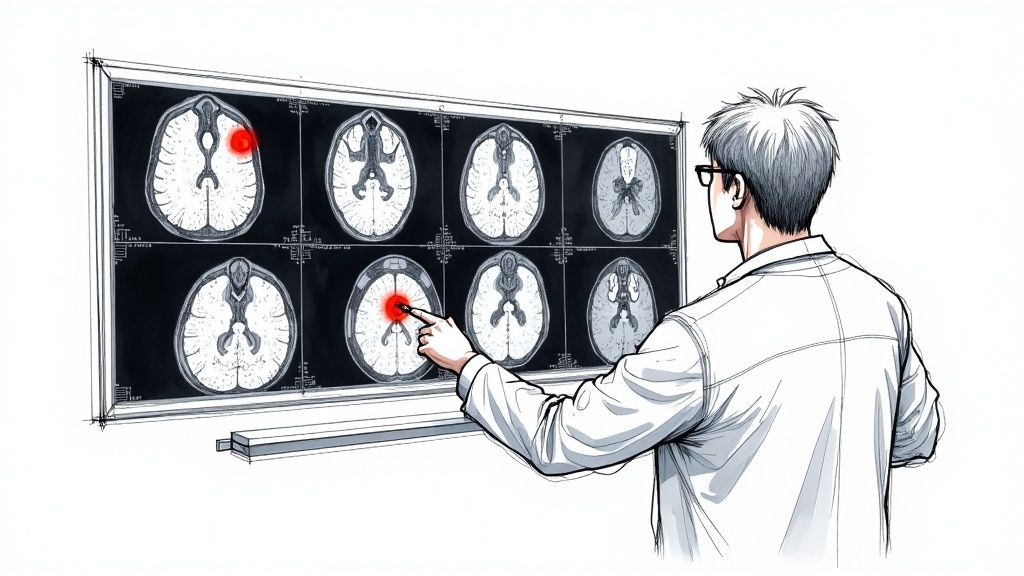
It’s best to think of this technology as a highly trained ‘second opinion’ that never gets tired. It can spot subtle patterns in a scan that might be almost invisible to the naked eye, flagging potential issues for a specialist to review. This capability allows clinicians to triage their caseloads more effectively, prioritising patients with critical conditions like cancer or stroke who need a diagnosis right away.
This isn’t just a theoretical perk; it’s a direct answer to some very real and pressing challenges. We’re seeing significant delays in diagnostic reporting, and the numbers are startling. In 2024, a record 976,000 scans in the NHS breached the one-month target waiting time for results. That’s a staggering 28% increase from 2023, and it’s a bottleneck that AI is perfectly suited to help clear.
Enhancing Diagnostic Accuracy and Speed
The real value of AI in diagnostics is its ability to plough through massive amounts of visual data with unwavering consistency. It doesn't suffer from fatigue or the pressure of a heavy workload, which helps reduce the risk of human error and ensures every scan is analysed to the same high standard.
AI isn’t here to replace clinicians. It's an augmentation tool, empowering them to make faster, more confident decisions by giving them deeper insights from medical data. It doesn't diminish their expertise; it sharpens it.
The result is a much shorter path from scan to diagnosis. For conditions where every minute counts, this acceleration can dramatically improve a patient's outcome. For the healthcare organisation itself, this translates into a more efficient workflow and smarter allocation of specialist resources. For example, our own medical imaging analysis tool, https://www.ekipa.ai/products/diagnoo, shows just how effectively AI can interpret scans with incredible accuracy, providing crucial support to the diagnostic process.
Key Applications in Medical Imaging
AI is already making a tangible difference across several diagnostic specialities. Some of the most exciting areas include:
- Oncology: Identifying cancerous tumours in mammograms, lung CT scans, and images of skin lesions with incredible sensitivity, often catching them at an earlier stage than traditional methods.
- Neurology: Detecting early signs of strokes, aneurysms, or degenerative diseases like Alzheimer's from brain scans, which paves the way for quicker treatment.
- Cardiology: Analysing cardiac MRIs to assess heart function and spot abnormalities that might otherwise lead to heart failure.
And this technology isn’t just confined to radiology. We're seeing it revolutionise other diagnostic fields too. Take artificial intelligence in pathology, where algorithms can analyse tissue samples with a level of detail that was previously unimaginable, leading to better patient outcomes. By equipping clinicians with these powerful analytical tools, we're fundamentally raising the standard of care and shifting diagnostics from being reactive to truly proactive and precise.
Shifting from Reactive to Predictive Patient Care
For decades, the healthcare model has been fundamentally reactive. We wait for something to break, then we try to fix it. But what if we could see problems developing long before a patient ever felt a symptom? This is the core promise of AI in healthcare: moving us away from a one-size-fits-all, reactive system towards one that's proactive and deeply personalised.
Think of it like an incredibly sophisticated early warning system for the human body. Generative AI algorithms can sift through millions of anonymised health records, spotting subtle patterns and connections that are impossible for a human to see. This isn't about predicting the weather; it's about forecasting the likelihood of someone developing diabetes or heart disease years in advance. For this to work, a close partnership—an AI co creation—between data scientists and clinicians is absolutely essential.
This isn't science fiction; it's already being put into practice. A standout example in the UK is an AI model called Foresight. It was trained on the anonymised health records of a staggering 57 million patients in England's NHS. The result? This generative AI can predict hospitalisations, heart attacks, and hundreds of other health outcomes. If validated across different patient populations, it could completely reshape how we deliver care and manage resources. You can dive into the full research about this groundbreaking AI model to learn more.
From Population Health to Individual Wellness
This predictive power opens the door to intervening much, much earlier. Instead of waiting for a condition to become severe, a GP can proactively reach out to someone at high risk, recommending specific lifestyle changes or preventative treatments. This is a game-changer for managing chronic diseases, which place an enormous burden on NHS budgets.
The image below breaks down the key areas where AI is already making its mark, from smarter diagnostics to smoother hospital operations.
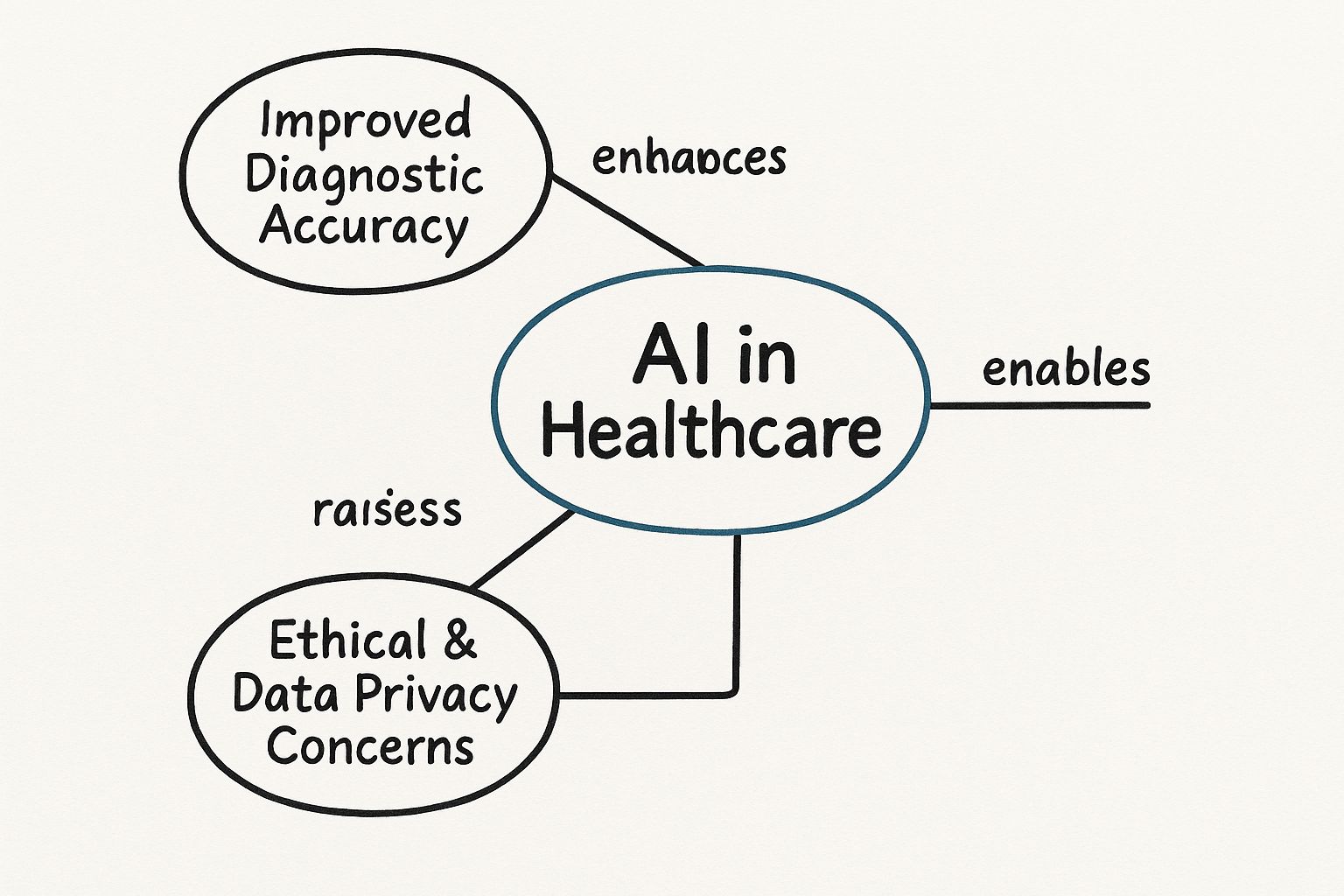
As the graphic shows, the benefits are all connected. Better diagnostics and operational wins go hand-in-hand with vital ethical considerations. The end goal is a healthcare system that's not just more efficient, but more resilient and responsive to our real needs.
By forecasting health risks, AI empowers clinicians to move from a "break-fix" model of medicine to one centred on continuous wellness and prevention. This is where true value is unlocked.
Making this leap involves more than just plugging in new software. It takes a clear vision. A well-defined AI strategy consulting process is crucial for healthcare organisations to pinpoint the right datasets and predictive models for their specific patient populations. By anticipating needs before they become critical, we can allocate resources more intelligently, reduce costly hospital admissions, and deliver better, more humane care. It’s about finally using data not just to treat sickness, but to actively promote health.
Streamlining Hospital Operations with AI
When we talk about AI in healthcare, it’s easy to focus on the flashy, front-line applications like diagnostics. But some of the most profound changes are happening behind the scenes, overhauling the very operational engine that keeps a hospital running. The real magic isn't just in making a diagnosis; it's in creating an environment where clinicians are free to focus entirely on their patients, without being swamped by administrative drag.
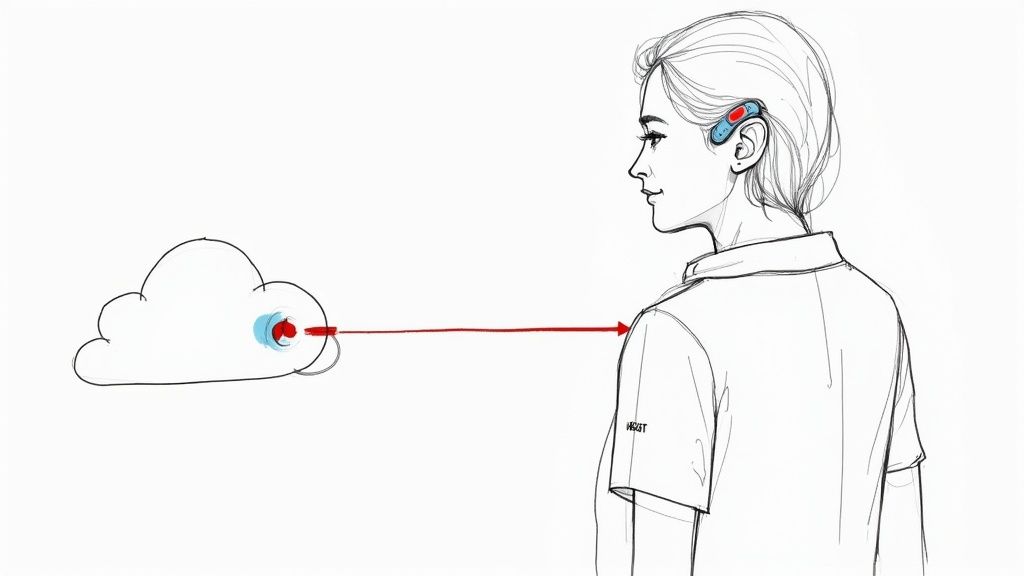
This operational boost comes down to intelligent workflow automation. It’s about tackling the repetitive, time-sucking tasks that are a major cause of staff burnout. Think of AI managing patient schedules, updating records, or handling billing cycles with near-perfect accuracy. This shift doesn’t replace people; it frees them up for the work that genuinely requires a human touch—caring for patients.
But the improvements go much deeper than just paperwork. Modern AI models can forecast patient admission rates, which allows hospitals to get smarter about allocating beds and creating staffing rotas. This means resources are deployed exactly where they’re needed most, smoothing out the unpredictable peaks and troughs of patient flow.
Optimising the Healthcare Supply Chain
One of the biggest operational headaches for any hospital is managing its supply chain. It's a constant balancing act between having enough essential supplies on hand and not tying up huge amounts of capital in stockrooms. This is where AI is proving to be a game-changer.
By digging into historical data and predicting future demand, AI systems can now automate procurement and manage inventory with incredible precision. This isn't just guesswork; it's a data-led approach that cuts down on waste and, crucially, prevents shortages of everything from surgical gloves to critical medications. For a hospital executive, that translates to better financial health and a more resilient, reliable care environment.
AI transforms hospital logistics from a reactive scramble to a predictive science. By ensuring the right resources are in the right place at the right time, it builds a safer, more efficient foundation for patient care.
For organisations looking to get started, you don't necessarily need a massive in-house team. Services like AI Automation as a Service offer a practical route, giving healthcare providers access to powerful tools without the heavy lifting of building them from scratch.
Building a More Efficient Future
Ultimately, putting AI to work on operations is about creating a healthcare experience that is seamless, efficient, and built around the patient. By developing better internal tooling, hospitals give their staff the support they need to do their jobs to the best of their ability.
These aren't just abstract efficiency gains. They have a direct impact on patient outcomes. When administrative friction is removed and resources are managed intelligently, the entire system becomes safer and more responsive. It’s a powerful reminder that some of the most important applications of AI and healthcare happen far from the operating theatre, making the whole system work better for everyone involved.
Navigating the Ethics of AI in Medicine
Trust is the single most important ingredient for any AI application in healthcare to succeed. As we weave these powerful systems into the fabric of clinical practice, we have to get to grips with some seriously complex ethical, governance, and regulatory questions. This isn't just about ticking compliance boxes; it's about laying the very foundation for a reliable future where AI and healthcare can coexist.
A few key concerns rightly dominate the conversation. How do we safeguard sensitive patient data when it’s the fuel for training these algorithms? What happens if an AI model, fed on historical data, ends up reinforcing or even amplifying existing biases against certain groups of people? And perhaps the thorniest question of all: who is ultimately accountable when an AI is involved in a clinical decision that goes wrong?
These aren't easy questions, and they demand clear, robust answers. Building a framework to address them is non-negotiable if we want to earn the confidence of both clinicians and patients. A solid ethical foundation isn't a "nice-to-have"—it's the bedrock for any successful, long-term integration of AI into our healthcare system.
The UK's Proactive Regulatory Approach
The UK has stepped up, taking a leading role in creating a safe harbour for medical AI innovation. The Medicines and Healthcare products Regulatory Agency (MHRA) is forging a clear path forward. In a landmark move in June 2025, the UK became the first country to join the HealthAI Global Regulatory Network, an initiative designed to align international standards for using AI safely and effectively in medicine. The goal here is to speed up patient access to proven AI tools, both within the NHS and on the global stage. You can find out more about the UK's leadership in safe AI adoption.
A core piece of this strategy is the MHRA's regulatory sandbox, which they’ve dubbed the AI Airlock.
The AI Airlock gives health tech companies a controlled space to test their AI-driven medical devices with direct regulatory oversight, long before they're considered for wider use. Think of it less as a brake on progress and more as a crucial set of guardrails for responsible innovation.
This kind of proactive regulation is a vital enabler, not a roadblock. It helps create a trusted ecosystem where developers can innovate with confidence, and clinicians can adopt new AI tools for business, knowing they've been put through their paces. Any effective AI Product Development Workflow simply has to build these ethical and regulatory checkpoints in from day one. It's this careful, structured approach that will help us build a healthcare future where technology serves humanity safely and effectively.
Crafting Your AI Implementation Roadmap
So, how do you move from talking about AI to actually doing it? For any healthcare leader, the key is having a clear, strategic plan. Without one, you risk running a few scattered experiments that fizzle out instead of creating real, lasting value. A joined-up approach, often guided by effective AI strategy consulting, is the only way to pinpoint the applications that will make the biggest difference to your specific organisation.
This journey always starts by identifying the right problems to solve. Forget chasing the latest shiny technology; focus on the genuine pain points in your clinical and operational workflows. This is where a collaborative AI co creation process is invaluable, bringing your tech partners and clinical teams around the same table. As we've explored in our AI adoption guide, this partnership is non-negotiable for building solutions that are practical and solve real-world needs.
Key Steps for a Successful Launch
Once you've got a clear goal, the next step is to take a hard look at your organisation's readiness. This isn’t just about having the right tech – it’s about your people and your processes.
- Get Your Data in Order: How good is your data? Is it accessible? Is it secure? High-quality, well-organised data is the fuel for any successful AI model. Garbage in, garbage out.
- Cultivate a Culture of Innovation: You need to encourage your teams to embrace new ways of working. Success hinges on clinical staff becoming champions of the technology, not roadblocks to its adoption.
- Invest in Your People: Training is essential. Clinicians need to understand how AI tools work to trust their outputs and, more importantly, to weave them seamlessly into their daily routines.
A successful AI implementation isn't a one-off project; it's a fundamental shift in how your organisation operates. It requires a clear blueprint that aligns technology with your core mission of delivering exceptional patient care.
Developing this kind of tailored blueprint is where a Custom AI Strategy report can provide a structured, actionable path forward. It helps map out the entire journey, from the initial spark of an idea to full-scale deployment. This includes everything from selecting the right real-world use cases to planning the nitty-gritty of the technical execution.
Ultimately, a robust AI Product Development Workflow is what transforms a great idea into a tangible, valuable asset. By moving through these stages methodically, you can roll out AI solutions with confidence. And if you need a hand, our expert team is always ready to help you navigate the path ahead.
Common Questions About AI in Healthcare
As AI finds its place within the UK's healthcare system, it’s only natural that questions and concerns pop up. Let's tackle some of the most common queries to shed some light on what AI's role really looks like on the ground.
Will AI Replace Doctors and Nurses in the UK?
In a word, no. The aim isn't to replace our brilliant clinicians, but to give them a powerful new toolkit. Think of AI as an incredibly capable assistant, one that can sift through mountains of data, take over repetitive admin tasks using things like AI Automation as a Service, and flag insights that a human might miss.
This frees up doctors and nurses to focus on what they do best: complex patient care, building relationships, and making nuanced judgements. It's a partnership, where technology enhances human expertise, not supplants it.
How Is Patient Data Kept Safe When Using AI?
Protecting patient data is non-negotiable. Here in the UK, any use of AI is wrapped in incredibly strict rules, from GDPR to the NHS's own data governance policies. AI models are typically trained on anonymised data inside secure, locked-down systems.
Initiatives like the NHS's Secure Data Environments are a great example of this in action. They allow researchers to build and test AI tools without ever putting patient privacy at risk. As we covered in our AI adoption guide, the entire approach is built on using data ethically to deliver better care.
The core principle is clear: AI systems must earn the trust of both clinicians and the public. This is achieved through transparency, robust security measures, and a commitment to augmenting, not replacing, human care.
What Is the First Step for a Hospital to Implement AI?
The journey starts with strategy, not a shopping list for new tech. Before a single algorithm is deployed, a hospital needs to pinpoint its most significant challenges. Is it patient scheduling? Diagnostic backlogs? An AI strategy consulting process helps to nail this down.
This means talking to the people on the front lines—the clinical staff—to understand their pain points and looking at the existing data infrastructure. From there, you can build a solid business case with clear, measurable goals. Starting with a specific problem ensures the AI solution provides real, tangible value. A Custom AI Strategy report can be an invaluable roadmap for navigating this whole process.
Ready to define your healthcare organisation's future with AI? At Ekipa AI, we turn complex challenges into clear, actionable strategies. Let our experts guide you from initial concept to full-scale implementation. Start your AI journey with us today.

